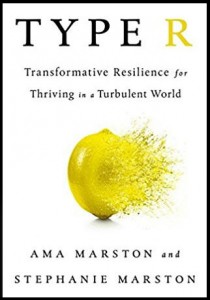How To Thrive in a Turbulent World


Forget Type As and Bs.
The future lies with Type Rs—the resilient individuals, leaders, businesses, families, and communities who turn challenges into opportunities in times of upheaval, crisis, and change.
Type R stands for Transformative Resilience and is the focus of a new book by strategy and leadership expert Ama Marston and psychotherapist Stephanie Marston — Type R: Transformative Resilience for Thriving in a Turbulent World. According to the authors, those who follow the principles of this program find themselves more and more able to cope with difficult circumstances in these challenging times. Readers learn strategies that allow them to spring forward rather than bouncing back to outdated approaches.
The nature of stress has changed dramatically in recent years. We now live in a world where significant global challenges—including climate change, terrorism, and political turmoil—impact us daily,

alongside the stresses and strains of our professional and personal lives, from illnesses to job changes and business restructuring.
Drawing upon research that spans personal and professional issues, local and global, and reaches across psychology, neuroscience, business, and politics, Ama and Stephanie Marston explain how you can cultivate Type R strategies and mindsets and can develop Type R leadership vision and cultures in ways that will prove critical for navigating disruptive change.
Some of their advice for individuals includes:
- Questioning your default mindset – by training our “mindset alertness,” we become aware of how our current point of view operates in our lives.
- Practice emotional hygiene – by learning how to interrupt recurring cycles of negative inner dialogue.
- Connect to the context – by understanding how to balance between taking responsibility for ourselves while also acknowledging the larger context and not blaming ourselves for things outside of our control.
- Examine your relationship control – by acknowledging how we choose to interpret or frame circumstances is in our control as is the response we choose.
- Clarify what matters – by asking if our priorities are reflected in the things we devote our time and energy to in coping with this challenging situation.
- Ask different questions – by cultivating inquisitive thinking, we can approach challenges more objectively by asking nonjudgmental questions.
- Concentrate on learning – by choosing to see challenging circumstances as learning opportunities rather than a time to shut down.
- Create a failure CV – by considering failure as an essential part of a Type R mindset.
 Type Rs range from a woman doctor who lost both legs in a tornado and became a determined advocate for children with prosthetics to an HIV-positive man diagnosed as terminally ill who has lived another 35 years as a leader of various causes. Their adversities vary, but all share a determination not to allow their setback to define them, to keep a positive mindset and “move away from a tendency to catastrophize,” and to reframe their situations, thereby choosing their own attitudes.
Type Rs range from a woman doctor who lost both legs in a tornado and became a determined advocate for children with prosthetics to an HIV-positive man diagnosed as terminally ill who has lived another 35 years as a leader of various causes. Their adversities vary, but all share a determination not to allow their setback to define them, to keep a positive mindset and “move away from a tendency to catastrophize,” and to reframe their situations, thereby choosing their own attitudes.
In Type R, Ama and Stephanie present:
- Insight into the new social, economic, and global challenges and trends we face and the outdated thinking that poses barriers to us thriving in our current world.
- Why “bouncing back” is a terrible waste of adversity and the research that shows how growth from difficult circumstances is not only preferable, but essential.
- They Type R skills and evidence of what makes us better equipped for uncertainty, change, and stress when grit and persistence fall short.
- What good leaders and organizations have learned and the steps they’ve taking to use change and challenges to their advantage.
- How Type Rs create a ripple effect and make a contribution to the larger world.
- Inspiring Type R stories of individual, collective and business triumphs in the face of challenges from mounting stress and illness to climate change and financial crisis.
- Tips for putting Type R strategies in to action in our own lives; our work and leadership; and in the larger world.
Type R proves that there is much we can learn from those who use change, stress, and adversity as springboards to progress and innovation in a chaotic world.
